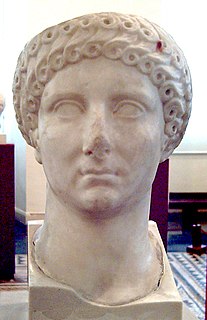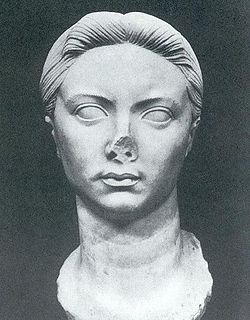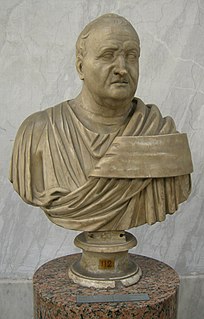
Vipsania Agrippina, commonly referred to as Agrippina the Elder, was a prominent member of the Julio-Claudian dynasty. She was born in c. 14 BC the daughter of Marcus Vipsanius Agrippa, a close supporter of Rome's first emperor Augustus, and Augustus' daughter Julia the Elder. At the time of her birth, her brothers Lucius and Gaius were the adoptive sons of Augustus and were his heirs until their deaths in AD 2 and 4, respectively. Following their deaths, her cousin Germanicus was made the adoptive son of Tiberius as part of Augustus' succession scheme in the adoptions of AD 4 in which Tiberius was adopted by Augustus. As a corollary to the adoption, Agrippina was wed to Germanicus in order to bring him closer to the Julian family.

The Julio-Claudian dynasty was the first Roman imperial dynasty, consisting of the first five emperors—Augustus, Tiberius, Caligula, Claudius, and Nero—or the family to which they belonged. They ruled the Roman Empire from its formation under Augustus in 27 BC until AD 68, when the last of the line, Nero, committed suicide. The name "Julio-Claudian dynasty" is a historiographical term derived from the two main branches of the imperial family: the Julii Caesares and Claudii Nerones.

Marcus (Vipsanius) Agrippa was a Roman general, statesman and architect. He was a close friend, son-in-law, and lieutenant to Augustus and was responsible for the construction of some of the most notable buildings in the history of Rome and for important military victories, most notably at the Battle of Actium in 31 BC against the forces of Mark Antony and Cleopatra. As a result of these victories, Octavian became the first Roman Emperor, adopting the name of Augustus Caesar. Agrippa assisted Augustus in making Rome "a city of marble" and renovating aqueducts to give all Romans, from every social class, access to the highest quality public services. He was responsible for the creation of many baths, porticoes and gardens, as well as the original Pantheon. Agrippa was also husband to Julia the Elder, maternal grandfather to Caligula, and maternal great-grandfather to the Emperor Nero.

Tiberius Caesar Augustus was the second Roman emperor, reigning from AD 14 to 37. He succeeded his stepfather, the Roman emperor Augustus.

Marcus Agrippa Postumus, later named Agrippa Julius Caesar, was the youngest son of Marcus Vipsanius Agrippa and Julia the Elder, the daughter and only biological child of the Roman Emperor Augustus. Augustus initially considered Postumus as a potential successor and formally adopted him as his heir, but banished him from Rome in AD 6 on account of his ferocia. In effect, this action cancelled his adoption and virtually assured Tiberius' emplacement as Augustus' sole heir. Postumus was ultimately executed by his own guards shortly after Augustus' death in AD 14.

Gaius Caesar was consul in AD 1 and the grandson of Augustus, the first emperor of the Roman Empire. Although he was born to Marcus Vipsanius Agrippa and Julia, Augustus' only daughter, Gaius and his younger brother, Lucius Caesar, were raised by their grandfather as his adopted sons and joint-heirs to the empire. He would experience an accelerated political career befitting a member of the Julio-Claudian dynasty, with the Roman Senate allowing him to advance his career without first holding a quaestorship or praetorship, offices that ordinary senators were required to hold as part of the cursus honorum.

The gens Julia was one of the most ancient patrician families at ancient Rome. Members of the gens attained the highest dignities of the state in the earliest times of the Republic. The first of the family to obtain the consulship was Gaius Julius Iulus in 489 BC. The gens is perhaps best known, however, for Gaius Julius Caesar, the dictator and grand uncle of the emperor Augustus, through whom the name was passed to the so-called Julio-Claudian dynasty of the first century AD. The nomen Julius became very common in imperial times, as the descendants of persons enrolled as citizens under the early emperors began to make their mark in history.
Gaius Asinius Gallus Saloninus was the son of Gaius Asinius Pollio, consul in 40 BC, and Quinctia. He is best known as the second husband of Vipsania, eldest daughter of Marcus Vipsanius Agrippa and first wife of Tiberius, who ultimately imprisoned him.

Vipsania Agrippina was the first wife of the Emperor Tiberius. She was the daughter of Marcus Vipsanius Agrippa and Pomponia Caecilia Attica, thus a granddaughter of Titus Pomponius Atticus, the best friend of Cicero.

Nero Julius Caesar was the adopted grandson and heir of the Roman Emperor Tiberius, alongside his brother Drusus. Born into the prominent Julio-Claudian dynasty, Nero was the son of Tiberius' general and heir, Germanicus. After the deaths of his father and of Tiberius' son, Drusus the Younger, Nero and his brother Drusus were adopted together by Tiberius in September AD 23. As a result of being heirs of the emperor, he and his brother enjoyed accelerated political careers.

Gnaeus Domitius Ahenobarbus was a close relative of the five Roman Emperors of the Julio-Claudian dynasty. Domitius was the only son of Antonia Major and Lucius Domitius Ahenobarbus. His siblings were Domitia Lepida the Elder and Domitia Lepida the Younger, mother of the empress Valeria Messalina. He was brother-in-law and first cousin once removed of the Emperor Caligula, maternal cousin of the Emperor Claudius and the biological father of the Emperor Nero.

Lucius Caesar was a grandson of Augustus, the first Roman emperor. The son of Marcus Vipsanius Agrippa and Julia the Elder, Augustus' only daughter, Lucius was adopted by his grandfather along with his older brother, Gaius Caesar. As the emperor's adopted sons and joint-heirs to the Roman Empire, Lucius and Gaius had promising political and military careers. However, Lucius died of a sudden illness on 20 August AD 2, in Massilia, Gaul, while traveling to meet the Roman army in Hispania. His brother Gaius also died at a relatively young age on 21 February, AD 4. The untimely loss of both heirs compelled Augustus to redraw the line of succession by adopting Lucius' younger brother, Agrippa Postumus as well as his stepson, Tiberius on 26 June AD 4.

Vipsania Julia Agrippina nicknamed Julia Minor and called Julia the Younger by modern historians, was a Roman noblewoman of the Julio-Claudian dynasty. She was emperor Augustus' first granddaughter, being the first daughter and second child of Julia the Elder and her husband Marcus Vipsanius Agrippa. Along with her siblings Julia was raised and educated by her maternal grandfather Augustus and her maternal step-grandmother Livia Drusilla. Just like her siblings she played an important role in the dynastic plans of Augustus, but much like her mother she was disgraced due to infidelity later on in her life.
The gens Scribonia was a plebeian family at ancient Rome. Members of this gens first appear in history at the time of the Second Punic War, but the first of the Scribonii to obtain the consulship was Gaius Scribonius Curio in 76 BC.

Julia the Elder, known to her contemporaries as Julia Caesaris filia or Julia Augusti filia, was the daughter of Augustus Caesar, the first Roman Emperor, and his second wife, Scribonia. Julia was also stepsister and second wife of the Emperor Tiberius; maternal grandmother of the Emperor Caligula and the Empress Agrippina the Younger; grandmother-in-law of the Emperor Claudius; and maternal great-grandmother of the Emperor Nero. Her epithet 'the Elder' distinguishes her from her daughter, Julia the Younger.

Octavia the Younger was the elder sister of the first Roman Emperor, Augustus, the half-sister of Octavia the Elder, and the fourth wife of Mark Antony. She was also the great-grandmother of the Emperor Caligula and Empress Agrippina the Younger, maternal grandmother of the Emperor Claudius, and paternal great-grandmother and maternal great-great-grandmother of the Emperor Nero.
Claudia Marcella Major (PIR2 C 1102; Major Latin for the elder) also known as Marcella the Elder was the senior niece of Roman emperor Augustus, being the eldest daughter of his sister Octavia Minor and her first husband Gaius Claudius Marcellus Minor.
The gens Asinia was a plebeian family at Ancient Rome, which rose to prominence during the first century BC. The first member of this gens mentioned in history is Herius Asinius, commander of the Marrucini during the Social War. The Asinii probably obtained Roman citizenship in the aftermath of this conflict, as they are mentioned at Rome within a generation, and Gaius Asinius Pollio obtained the consulship in 40 BC.

The gens Pomponia was a plebeian family at Rome. Its members appear throughout the history of the Roman Republic, and into imperial times. The first of the gens to achieve prominence was Marcus Pomponius, tribune of the plebs in 449 BC; the first who obtained the consulship was Manius Pomponius Matho in 233 BC.
The gens Domitia was a plebeian family at Rome. The first of the gens to achieve prominence was Gnaeus Domitius Calvinus, consul in 332 BC. His son, Gnaeus Domitius Calvinus Maximus, was consul in 283, and the first plebeian censor. The family produced several distinguished generals, and towards the end of the Republic, the Domitii were looked upon as one of the most illustrious gentes.















